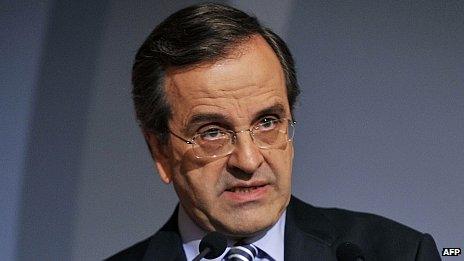Profile: Greek conservative leader Antonis Samaras
- Published

Antonis Samaras has been in politics for most of his life
Greece's new Prime Minister Antonis Samaras, leader of the conservative New Democracy party, is seen by supporters as a man who sticks to his guns.
Critics prefer to regard him as an ambitious opportunist.
An economist by training, he made his name in the early 1990s as foreign minister when his campaign against the new state of Macedonia's right to use the same name as a region in Greece reached such a pitch that he was sacked from his post and left the party.
In 2010, back with New Democracy again and now its leader in opposition, he refused to support Socialist Prime Minister George Papandreou over the first EU-IMF bailout.
He scuppered hopes of national consensus, rejecting the austerity measures the 110bn-euro (£89bn; $138bn) loan package entailed.
Germany's media, as <link> <caption>The Guardian noted in an article</caption> <url href="http://www.guardian.co.uk/world/2011/aug/05/greek-austerity-opponent-antonis-samaras" platform="highweb"/> </link> , regarded the intransigent conservative leader as "the fly in the ointment, the gadfly who... put personal ambition before national interest".
Yet last year, as the prospect of national bankruptcy loomed, he backed the follow-up 130bn-euro bailout.
His prevarication over the bailouts has been all the more galling for Greece's partners because his party has been widely accused of creating the country's debt crisis in the first place.
New Democracy narrowly secured victory in the June polls, and Mr Samaras said the result represented a vote for the country "to remain on its European path and in the eurozone".
The beards
Descended from a wealthy family of ethnic Greek merchants from Alexandria, Mr Samaras was born on 23 May 1951 in Athens, where he received an elite education at Athens College.
He grew up among the capital's well-connected families, playing tennis and going to parties at private clubs, <link> <caption>Lia Daniolou, a New Democracy party official who has known him since their childhood days, told Bloomberg</caption> <url href="http://www.bloomberg.com/news/2011-09-06/samaras-vies-with-papandreou-as-men-of-amherst-college-contest-greek-fate.html" platform="highweb"/> </link> .
At the age of 17, he won the Greek Teen Tennis Championship.
He pursued his studies in the US, first economics at Amherst College, then Harvard Business School.
At Athens College, he rubbed shoulders with Mr Papandreou, while at Amherst in the early 1970s, he shared a dormitory with his future political opponent.
<link> <caption>In an article for the LA Times</caption> <url href="http://articles.latimes.com/2011/aug/18/world/la-fg-greece-politics-20110818" platform="highweb"/> </link> , college mates recall how the two young men were united by their opposition to the military junta that ruled Greece. Both grew beards after the junta famously banned them.
"One [Papandreou] was like a loyal and friendly Labrador; the other [Samaras], an Afghan wolfhound," said Philip Tsiaras, a New York-based artist who boarded at the college at the same time.
"They were temperamental opposites, but somehow complemented each other. It was their forced isolation… that brought them together."
The existence of such cosy ties between Greece's mainstream political leaders explains in part why voters swung to the radical left and right at the May 2012 elections.
'Vendetta' years
At the age of 26, Mr Samaras was first elected to the Greek parliament as an MP for New Democracy.
Prime Minister Konstantinos Mitsotakis brought him into his cabinet as finance minister in 1989, making him foreign minister later the same year.
However, Mr Samaras effectively split New Democracy in 1992 over his hard line against Macedonia.
He set up his own small party, Political Spring, causing political disaster for Mr Mitsotakis.
Locked in a feud with his former political boss, he stayed outside New Democracy for more than a decade, until he was allowed to return in 2004.
It was a "famous vendetta... full of passion, hate and revenge", <link> <caption>according to an article in Greek Reporter</caption> <url href="http://greece.greekreporter.com/2012/05/21/antonis-samaras-dora-bakogiannis-a-power-hungry-vendetta/" platform="highweb"/> </link> .
In 2009, Mr Samaras defeated Mr Mitsotakis's daughter, Dora Bakogiannis, for the party leadership and she left the party soon afterwards.
Yet this dispute, too, appears to have been resolved eventually: Ms Bakogiannis returned to the party in 2012, soon after the May election.
'Jobs first'
New Democracy fought <link> <caption>the May election</caption> <url href="http://www.bbc.co.uk/news/world-europe-18076757" platform="highweb"/> </link> on a traditional anti-Socialist platform.
While it emerged as the biggest party, such was the fracturing of the established political system that it could not form a government, and some accused Mr Samaras of having failed to grasp the changing concerns of the voters.
Some say his apparent reconciliation with Dora Bakogiannis is evidence of a shrewder strategy to broaden his power base.
"Samaras has learned from his mistakes and he has opened up to opinions from more people - he listened," an unnamed New Democracy figure, who has been critical of Mr Samaras in the past, told Reuters news agency.
Mr Samaras now offers a caring conservative agenda, while heaping scorn on the radical left coalition Syriza, which came a shock second in May.
On the one hand, he has promised to help business by cutting sales tax. On the other, he promises to mobilise European funds for construction projects to revive the economy.
He also says he wants to reverse cuts to pensions for the needy, protect private sector wages and space out austerity reforms.
But top of his agenda are job protection and job creation.
"Our whole structure of our whole strategy is new jobs - first of all to protect the old ones and have new jobs," he told Reuters ahead of the 17 June vote.
He has portrayed himself as a man who will negotiate with Greece's creditors to get the country back on track as a responsible member of the eurozone, instead of picking a fight with them.
"The drachma means death right now," he told Greek TV.
However, the question remains: after 35 years in politics, is Antonis Samaras the right person to lead Greece to renewal?